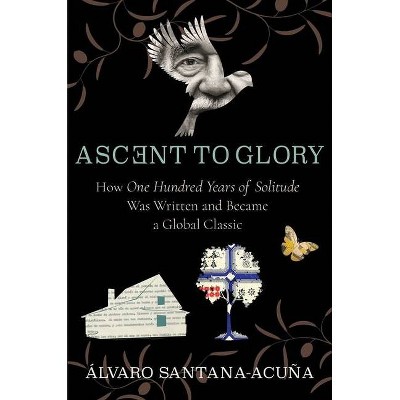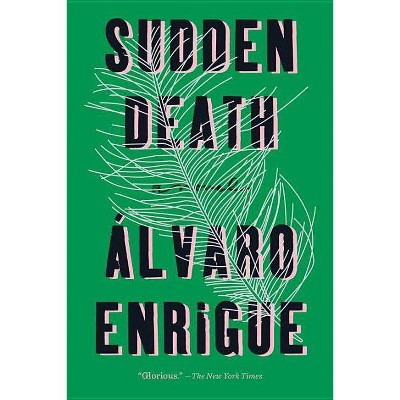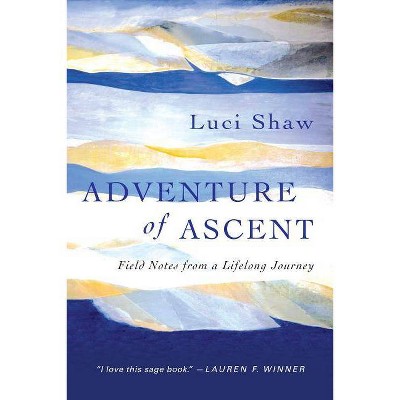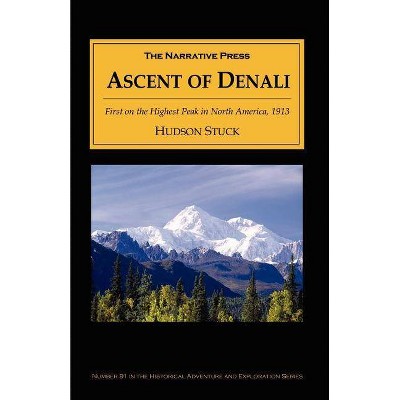Ascent to Glory - by Álvaro Santana-Acuña (Paperback)

Similar Products
Products of same category from the store
AllProduct info
<p/><br></br><p><b> About the Book </b></p></br></br><i>Ascent to Glory</i> is a groundbreaking study of <i>One Hundred Years of Solitude</i>, from the moment Gabriel García Márquez first had the idea for the novel to its global consecration. Using new documents from the author's archives, Álvaro Santana-Acuña shows how García Márquez wrote the novel, going beyond the many myths that surround it.<p/><br></br><p><b> Book Synopsis </b></p></br></br>Gabriel García Márquez's novel <i>One Hundred Years of Solitude</i> seemed destined for obscurity upon its publication in 1967. The little-known author, small publisher, magical style, and setting in a remote Caribbean village were hardly the usual ingredients for success in the literary marketplace. Yet today it ranks among the best-selling books of all time. Translated into dozens of languages, it continues to enter the lives of new readers around the world. How did <i>One Hundred Years of Solitude</i> achieve this unlikely success? And what does its trajectory tell us about how a work of art becomes a classic? <p/><i>Ascent to Glory</i> is a groundbreaking study of <i>One Hundred Years of Solitude</i>, from the moment García Márquez first had the idea for the novel to its global consecration. Using new documents from the author's archives, Álvaro Santana-Acuña shows how García Márquez wrote the novel, going beyond the many legends that surround it. He unveils the literary ideas and networks that made possible the book's creation and initial success. Santana-Acuña then follows this novel's path in more than seventy countries on five continents and explains how thousands of people and organizations have helped it to become a global classic. Shedding new light on the novel's imagination, production, and reception, <i>Ascent to Glory</i> is an eye-opening book for cultural sociologists and literary historians as well as for fans of García Márquez and <i>One Hundred Years of Solitude</i>.<p/><br></br><p><b> Review Quotes </b></p></br></br><br>A compelling alternative critical approach to the study of literary classics in general.--Latino Book Review<br><br><i>Ascent to Glory</i> is that rarest of things, a readable and enjoyable scholarly book.--ReVista: Harvard Review of Latin America<br><br>If Santana-Acuña's book is a love letter to <i>One Hundred Years of Solitude</i> and its fans, it's also a love letter to those wizened enough to resist sanding off the jagged edges of history.--Public Books<br><br>The book is well founded and attention grabbing, while its most important contribution is probably its perspective on cultural value and the classic: it emphasizes the social story which makes the artwork an integral part of people's lives, accommodating both the creative act and the role of a multifaceted process of cultural brokerage.--Cultural Sociology<br><br>This is a book for those interested in the sociology of literature, Latin American literature in particular. Recommended.--Choice<br><br>An essential work for admirers of <i>One Hundred Years of Solitude </i>as well as for those interested in examining the mechanisms of a text acquiring a global identity.--Telegraph India<br><br>An intelligent, appealing, instructive book.--St. Orberose<br><br>Placing García Márquez so carefully among the nuanced forces of Latin American literature, however, makes this an essential book for readers of <i>Cien Años</i> and a rewarding one for anyone interested in the globalization of world literature.--World Literature Today<br><br>The book constitutes an enjoyable narrative that can be read by specialists and non-specialists alike.--Journal of Cultural Analysis and Social Change<br><br><i>Ascent to Glory</i> is essential reading for anyone interested in Latin American literature in general and the life and work of Gabriel García Márquez in particular, but should also be of interest to anyone interested in culture and its workings (including star- and 'classic'-making).--Complete Review<br><br>Gabriel García Márquez had a gift for friendship, and in <i>Ascent to Glory</i> Álvaro Santana-Acuña reveals the circle of friends and collaborators who helped bring <i>One Hundred Years of Solitude</i> into print, and he exposes the broader network of readers, reviewers, and agents of different kinds who made it one of the most beloved novels of the 20th century. García Márquez had a gift for storytelling and a gift for friendship, and <i>Ascent to Glory</i> is a revealing study of what can be achieved when the two come together.--Stephen Enniss, Director of the Harry Ransom Center<br><br><i>Ascent to Glory</i> is an original and important book. It's very well written, theoretically complex, and advances a compelling explanation of the processes through which <i>Cien Años de Soledad</i> achieved the status of a classic. Alvaro Santana Acuña is going to be a well-known and respected scholar in cultural sociology for years to come.--Claudio E. Benzecry, author of <i>The Opera Fanatic: Ethnography of an Obsession</i><br><br>I have been waiting for this book. <i>One Hundred Years of Solitude</i> is arguably the most influential novel of the last fifty years, but how did that happen? Álvaro Santana-Acuña's extraordinary feat is to lay bare the mechanisms through which a great work of fiction becomes a whole culture. He has probably given us the definitive account of that miracle.--Juan Gabriel Vásquez, author of <i>The Shape of the Ruins: A Novel</i><br><br>In this work of love and true scholarship, Santana-Acuña opens new vistas for how to make sense of world literature today. In beautifully crafted prose, his meticulous analysis delights and enlightens about how it happens that creative work first gets legs and goes on to take new life and meaning again and again, for different people across many contexts and times. Academics and the general public alike will emerge from <i>Ascent to Glory</i> with a sense of satisfaction and improved understanding. I recommend it to all those who appreciate global works of art, literary or otherwise, or literature tout court.--Michèle Lamont, past president of the American Sociological Association<br><br>García Márquez's novel used the writer's own past to imagine, between the lines, a better future. As one of those sociologists who is a 'historian of the present, ' Álvaro Santana-Acuña has reflected the Colombian writer's singular achievement. I believe his readers will be inspired to use this book, which is full of new ideas, to think more lucidly about the unusually challenging future that now lies before us, both in literature and in life.--Gerald Martin, author of <i>Gabriel García Márquez: A Life</i><br><p/><br></br><p><b> About the Author </b></p></br></br>Álvaro Santana-Acuña is an assistant professor of sociology at Whitman College.
Price History
Price Archive shows prices from various stores, lets you see history and find the cheapest. There is no actual sale on the website. For all support, inquiry and suggestion messagescommunication@pricearchive.us




















